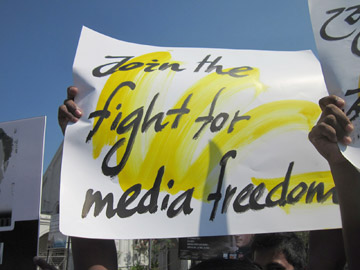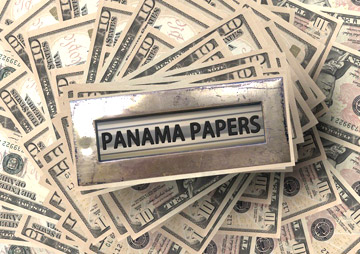|
RSF's Press Freedom Index:
Sri Lanka records improvement
Sri Lanka has moved up 24 notches and ranked at 141st place in the
2016 World Press Freedom Index compiled by the Reporters sans Frontieres
(RSF) which was published last week.
The island was ranked at 165th last year.
|

Sri Lanka’s media |
The Index stated: "The new government has said journalists and
cyber-dissidents would no longer have to fear reprisals for their
political views or for articles on sensitive subjects as corruption and
the military. The Tamil media, long a target of the authorities,
including after the official end of the civil war in 2009, have seen a
decline in harassment and hope it will last." Nevertheless, the report
also highlighted declining status of media freedom. Finland ranked 1st
in the index as the country with the most freedom for journalists
followed by the Netherlands, Norway, Denmark, New Zealand, Costa Rica,
Switzerland, Sweden, Ireland and Jamaica.
Eretria turned out to be the worst place followed by North Korea,
Turkmenistan, Syria and China.
In South Asia, Bhutan ranked at 94, Nepal at 105, Afghanistan at 120,
India at 133, Bangladesh at 144 and Pakistan at 147.
The RSF ranking is based on pluralism, media independence, legal
protection and journalists' safety. RSF's Secretary-General Christophe
Deloire, stated the index showed "a deep and disturbing decline in
respect for press freedom" and "a climate of fear and tension combined
with increasing control over newsrooms by governments and private-sector
interests."
Europe (with 19.8 points) still has the freest media, followed
distantly by Africa (36.9), which for the first time overtook the
Americas (37.1), a region where violence against journalists is on the
rise. Asia (43.8) and Eastern Europe/Central Asia (48.4) follow, while
North Africa/Middle East (50.8) is still the region where journalists
are most subjected to constraints of every kind. The countries that fell
farthest include Poland (47th, down 29), where the ultra-conservative
government seized control of the public media, and (much farther down)
Tajikistan, which plunged 34 places to 150th as a result of the regime's
growing authoritarianism.
The Sultanate of Brunei (155th, down 34) suffered a similar fall
because gradual introduction of the Sharia and threats of blasphemy
charges have fuelled self-censorship. Burundi (156th, down 11) fell
because of the violence against journalists resulting from President
Pierre Nkurunziza's contested re-election for a third term. The same
"infernal trio" are in the last three positions: Turkmenistan (178th),
North Korea (179th) and Eritrea (180th).
Global Investigative Journalists' Network
Panama Papers data to be released next week
The International Consortium of Investigative Journalists will
release on May 9 a searchable database with information on more than
200,000 offshore entities that are part of the Panama Papers
investigation.
 The database will likely be the largest ever release of secret
offshore companies and the people behind them. The database will likely be the largest ever release of secret
offshore companies and the people behind them.
The data comes from the Panamanian law firm Mossack Fonseca, one of
the top players in the offshore world, and includes information about
companies, trusts, foundations and funds incorporated in 21 tax havens,
from Hong Kong to Nevada in the United States. It links to people in
more than 200 countries and territories.
When the data is released, users will be able to search through the
data and visualize the networks around thousands of offshore entities,
including, when possible, Mossack Fonseca's internal records of the
company's true owners. The interactive database will also include
information about more than 100,000 additional companies that were part
of the 2013 ICIJ Offshore Leaks investigation.
While the database opens up a world that has never been revealed on
such a massive scale, the application will not be a "data dump" of the
original documents - it will be a careful release of basic corporate
information.
ICIJ won't release personal data , the database will not include
records of bank accounts and financial transactions, emails and other
correspondence, passports and telephone numbers. The selected and
limited information is being published in the public interest.
Meanwhile ICIJ, the German newspaper Süddeutsche Zeitung which
received the leak, and other global media partners, including several
new outlets in countries where ICIJ has not been able to report, will
continue to investigate and publish stories in the months to come.
The Panama Papers investigation revealed the secret offshore dealings
of world leaders and other politicians as well as criminals and
celebrities. It exposed the role of big banks in facilitating secrecy
and tax evasion and avoidance. It showed how companies and individuals
blacklisted in the U.S. and elsewhere for their links to terrorism, drug
trafficking and other crimes were able to do business through offshore
jurisdictions.
Since its release, the Panama Papers investigation has led to high
profile resignations, including the prime minister of Iceland, triggered
official inquiries in multiple countries and put pressure on world
leaders and other politicians, such as Britain's Prime Minister David
Cameron, to explain their connections to offshore companies. It sparked
a new sense of urgency among lawmakers and regulators to close loopholes
and make information about the owners of shell companies public.
In the US, where several states act as tax havens for people from all
over the world, President Barack Obama commented on the Panama Papers
revelations and said global tax avoidance facilitated by secrecy
jurisdictions is "a huge problem." The US President added that "a lot of
it is legal, but that's exactly the problem. It's not that they're
breaking the laws, it's that the laws are so poorly designed."
Freedom House findings
Only 14 percent of the world's population enjoys a free press-that
is, where coverage of political news is robust, the safety of
journalists is guaranteed, state intrusion in media affairs is minimal,
and the press is not subject to onerous legal or economic pressures.
Forty percent of the world's population has a 'partly free' press,
and 46 percent live in 'not free' media environments. Steep declines
worldwide were primarily linked to heightened partisanship and
polarisation in many countries, and the degree of extralegal
intimidation and physical violence faced by journalists.
Among the countries that suffered the largest declines in 2015 were
Bangladesh (7 points), Turkey (6), Burundi (6), France (5), Serbia (5),
Yemen (5), Egypt (4), Macedonia (4) and Zimbabwe (4).
The world's 10 worst-rated countries and territories are: Belarus,
Crimea, Cuba, Equatorial Guinea, Eritrea, Iran, North Korea, Syria,
Turkmenistan, and Uzbekistan.
Freedom House is an independent watchdog organization that supports
democratic change, monitors the status of freedom around the world, and
advocates for democracy and human rights.
FMM marks Press Freedom Day
The Free Media Movement (FMM) will mark the International Press
Freedom Day on May 4 (Wednesday) with a special event in Colombo.
At the event, to be held at Hotel Janaki Colombo at 4 pm, the keynote
address titled "An Independent Media Regulatory Commission: Towards a
Free and Socially Responsible Media" will be delivered by Dr. Ranga
Kalansooriya, Regional Advisor for Asia, International Media Support.
IMS
IFJ to launch Press Freedom in South Asia 2015-16 report
The International Federation of Journalists, the world's largest
organization of journalists, will launch its Annual Press Freedom in
South Asia 2015-16 report in collaboration with UNESCO on 3 May in New
Delhi, India.
The report, titled 'Access to Information and Fundamental Freedoms:
This is Your Right!' will be launched at a special event organized to
observe the day dedicated to journalism and journalists at the India
International Centre, New Delhi from 10 am to 1 pm. Established in 1926
to foster the rights of journalists, IFJ represents around 600,000
members in 139 countries. |

